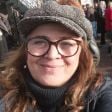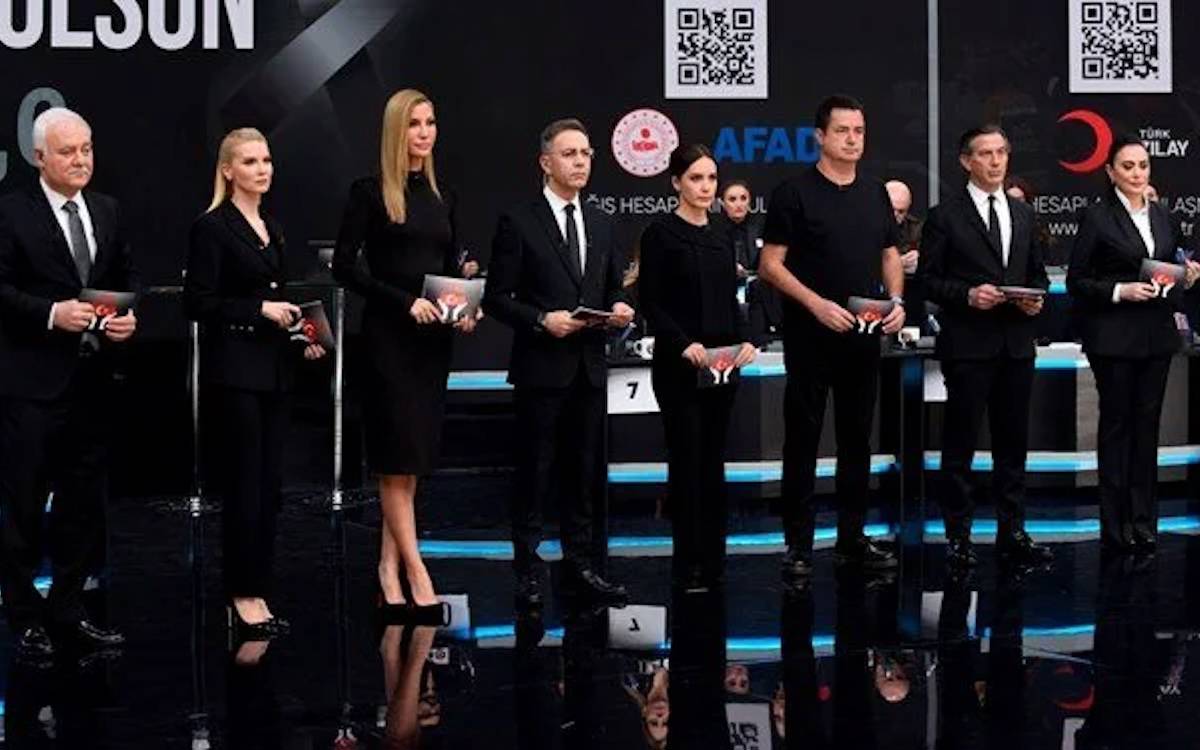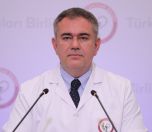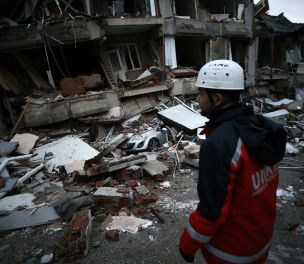Click to read the article in Turkish
The aid collected in the Netherlands for the earthquake disaster in Türkiye and Syria reached 108.501 million euros as of February 22, 2023.
The news from the February 6 earthquakes were the main agenda in the Netherlands on that day as elsewhere in the world.
Immediately after the quake, SHO (the cooperation foundation for the aid organizations) invited the people in the Netherlands to send money to the Giro 555 bank account for solidarity with Türkiye and Syria, using various public service ads and posters.
Not many know the name of SHO (Stichting Samenwerkende Hulporganisaties) that is an umbrella organization of 11 aid institutions in the Netherlands but if you ask about Giro 155, even children will know it.
Giro 555 is a bank account number that SHO uses for aid campaigns. Giro 55 starts a campaign on national scale after every large-scale disaster anywhere in the world.
Many municipalities including Amsterdam and Rotterdam donated 1 euro for each citizen in the city. Tens of municipalities participated in this campaign. Flags were halved in many official buildings in many cities, municipality council meetings started with a moment of silence for those we have lost in the earthquake.
The aid collected was over 100 million and the Foreign Minister said, talking about the aid in a TV program, "we are ready to give more."
The Social Affairs and Labor Minister of the Netherlands met with the representatives of many organizations* of people originally from Türkiye from every walk of life on February 9 in the ministry.
Minister Karien van Geniep made a short welcoming speech and offered her condolences and then left the meeting, but the ministry officials talked with all participants and took their views and proposals.
Mustafa Ayrancı, speaking on behalf of the Netherlands-Türkiye Workers Union (HTİB) said that they were concerned about how the aid collected in the Netherlands will be used and where it will be distributed. "We saw after the 1999 earthquake that only 30 percent of the money collected in the Netherlands was spent for Türkiye. We no more have trust in institutions such as Giro 555," he said.
On February 14, another meeting was organized by Amsterdam Mayor Femke Halsema in the municipality in which 30 guests from Syria and Türkiye participated. I was present there not as a journalist but as a guest.
Saadet Karabulut who was a Socialist Party MP for four periods was also present in the meeting. She is serving as the president of the council in the Amsterdam municipality since September 1, 2022.
Especially the problems that participants from Syria reflected were not ones that could be solved with money.
"Financial aid will not solve the problems in Syria. Our families, our people are living in a terrible war for so many years already."
"Our country was destroyed by war and now it is in tatters after the earthquake. Money will not solve the problems. Even when we have money we cannot send it. We cannot even communicate with our family. The doctors, health personnel of international aid organizations could hardly reach the region over Türkiye but now they cannot transfer medical stuff and equipment there. There is no air traffic from Damascus. You cannot solve these problems as a mayor but please make our voice heard by the MPs, ministers and the prime minister," said one woman and described the situation of her family in the earthquake region with tears in her eyes.
Amsterdam Municipality will also be organizing a commemoration for all those that we have lost and is holding meetings with the minorities of Türkiye and Syria origin for this purpose. The commemoration meeting is being planned for the second week of March.
Do people in the Netherlands know where the money they donate is spent?
Unfortunately people do not have sufficient and clear information on how and where the money collected in the European countries are spent, neither in the Netherlands, nor in Türkiye.
If we follow the news in Türkiye, adding up the money collected in the European countries, it should be possible to construct thousands of houses, to construct a new city with this money, and we should be happy.
However when we look closer our happiness is partly shadowed.
Because not all of this aid collected is spent for the disaster area.
Let us first go back to 1999. After the 1999 Gölcük-İstanbul earthquake 59 million euro of aid was collected but it was not many who learned that only 30 percent of this was spent for the earthquake region.
I had a TV program on MTV, a channel broadcasting in two languages, Dutch and the mother tongue of the minorities that I was working with and I had looked into this but I encountered a thick wall of defense.
My research showed that the expenses made for each state of the aid campaign was more than 30 percent of the money collected.
The remaining money was shared between the 10 aid organizations affiliated with SHO. However there was no clear answer when we asked which ones of these 10 organizations worked in the region, what they did and how much money they spent. From the information I collected it was possible to conclude that only 30 percent of the money collected was spent for the relief works carried out in Türkiye.
SHO and Giro 555 officials made unofficial statements but neither of them talked to me on camera.
In 2013 the "Nieuwsuur" broadcast in the first channel in the Netherlands discussed SHO critically in one program. Femke Halsema has also criticized SHO in those years. She had made a visit to the camps in Syria, Jordan, Lebanan and Türkiye in order to observe the problems of Syrian migrants. "Photographing the aid materials, medical support, education and psychological support programs on the spot was very easy but it was not done," she had said. She had said that the expenses and the work carried out should be made visible.
In that period only a few of the 10 aid organizations affiliated with SHO were working in the region.
SHO did not accept the accusations but also established an independent committee to carry out an audit.
This audit was made but no information was given to the press. The results presented in a report were not disclosed.
But later the Correspondent newspaper obtained this report. The report revealed that there were conflicts between the institutions affiliated with SHO.
The report by an independent committee was identifying three basic problems; the money was not going to the correct institutions, the institutions were not working together effectively and there was no independent board.
Most of the money was given to institutions with little experience in the disaster area and even to institutions such as Care Netherlands and World Vision that has not carried out any activities in Syria yet.
SHO management announced after the report in the newspaper that they will be making new regulations concerning the distribution of the money collected in Giro 555 within the organization and that they will be solving the problems that exist about working together.
Nearly 10 years have passed and now SHO is facing the earthquakes in Türkiye and Syria.
I again did some research for this article that I was preparing for bianet. I talked to Giro 55 public relations officer on the phone, but hearing my questions the officer wanted to direct me to their website.
I insisted on requesting an appointment with the chair of the campaign, but after hearing this and after hearing my questions the officer hung up.
This is a clear reply for all journalists. It means that nothing much has changed since the crisis after the released report in 2014 and that the same problems continue.
According to the information that I could reach, but I could not confirm the money that will be distributed to the institutions that do not have any activities in the earthquake-hit regions in Syria or in Türkiye is 108 million euro.
I also talked to Maite Vermeulan, the journalist who reported on SHO in 2014 in the Correspondet who said "I do not believe that anything much has changed."
The Netherlands Union of Workers from Türkiye (HTİB) issued a press statement on February 10 saying, "the aid for the earthquakes should be transparent," since they have witnessed the experience of the 1999 earthquake.
"It is a serious question for us to whom and through which aid organizations this collected money will be transferred. President Erdoğan wants this money to be sent to AFAD, which is the organization for disaster works, and not to be given to non-governmental organizations."
"However due to the corruption of Erdoğan and the official organizations under his control, nobody trusts them and they prefer to donate to non-governmental organizations."
"The World Bank has allocated a serious amount of money for the earthquakes in Türkiye and preferred to give this money not directly to the state but to local initiatives; which is a good and a striking example.
"On the other hand we also observe that the aid sent through international institutions are not transparent either. More than half the money collected is spent for the expenses of these institutions themselves, and very little part of the aid is being spent for the purpose. And it is not possible to get information on how much money has been collected and how it is distributed between different organizations. What we have therefore, is a lack of transparency. "
* HTİB (the Netherlands Union of Workers from Türkiye), Alevi Associations Federation, Religious Affairs Directorate, Milli Görüş, DİDİF (Democratic Workers Association Federation)
(SM/EMK/PE)





.jpg)

asasas.jpg)


